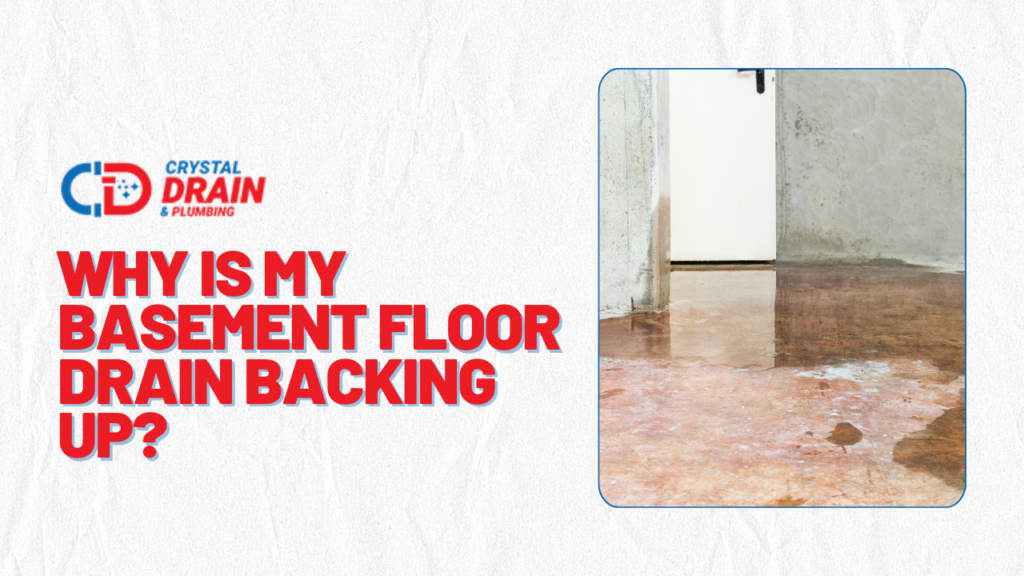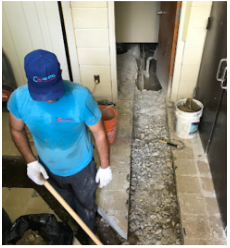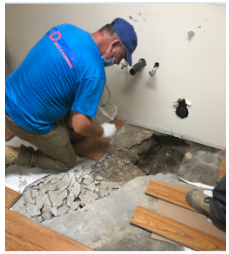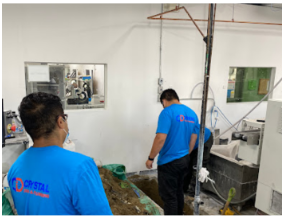Why Is My Basement Floor Drain Backing Up?

A basement floor drain backup can be a homeowner’s nightmare, leading to unwanted water accumulation, unpleasant odors, and potential damage to your property. At Crystal Drain & Plumbing, we understand the urgency and complexity of this issue. Here’s a detailed guide to understanding the causes and solutions for basement floor drain backups.
Common Causes of Basement Floor Drain Backups
1. Clogged Sewer Lines

Issue:
One of the most common causes of basement drain backups is a clogged sewer line. Debris, grease, and other waste materials can accumulate over time, leading to blockages that obstruct the flow of wastewater.
Solution:
Regularly schedule professional drain cleaning services like hydro-jetting to effectively remove blockages and ensure smooth flow in your sewer lines.
2. Tree Root Infiltration
Issue:
Tree roots can invade sewer lines through tiny cracks and joints, growing inside the pipes and causing significant blockages. These roots can completely obstruct the pipe, preventing wastewater from flowing through.
Solution:
A professional inspection using camera technology can identify root infiltration. Root cutting tools or hydro-jetting can remove the roots. Severe cases might require trenchless pipe repair or replacement.
3. Heavy Rainfall

Issue:
During heavy rainfall, the municipal sewer system can become overwhelmed, causing water to backflow into basement drains. This can lead to significant backups if the system cannot handle the excess water.
Solution:
Install a backwater valve to prevent sewer water from backing up into your home during heavy rainstorms. Regular maintenance and inspections can ensure this system works efficiently.
4. Broken or Collapsed Pipes
Issue:
Sewer lines can break or collapse due to aging infrastructure, ground movement, or heavy loads on the ground above. These structural issues can block the flow of wastewater, leading to backups.
Solution:
Regular inspections with a sewer camera can identify damaged sections of the pipe. Depending on the severity, trenchless pipe repair or replacement can address the issue without extensive excavation.
5. Improper Slope or Grading
Issue:
If the slope or grading of your sewer lines is not correctly set, it can hinder the flow of wastewater, leading to standing water and backups in your basement.
Solution:
Ensure your sewer lines are properly sloped and graded to facilitate the smooth flow of wastewater. Professional plumbers can assess and correct any slope issues.
6. Flushing Non-Flushable Items
Issue:
Items like wet wipes, sanitary products, and other non-degradable materials can cause clogs when flushed down toilets. These items accumulate in the sewer line, obstructing the flow of wastewater.
Solution:
Educate your household members on what can and cannot be flushed. Regular inspections and professional cleanings can prevent and address clogs caused by non-flushable items.
Maintenance & Preventive Measures
- Avoid Flushing Non-Flushables: Only flush toilet paper and human waste. Dispose of other items, such as wipes and sanitary products, in the trash to prevent clogs and blockages.
- Regular Maintenance: Schedule regular sewer line inspections and cleanings to catch and address issues before they become severe. This proactive approach can save you time and money in the long run.
- Tree Root Management: Be mindful of tree placement and root growth near sewer lines. Regular inspections can catch root infiltration early and prevent significant damage to your pipes.

- Install Drain Screens: Use drain screens in sinks, showers, and bathtubs to catch hair, food particles, and other debris before they enter your plumbing system. Clean these screens regularly to maintain optimal drainage.
- Monitor Water Pressure: High water pressure can stress your plumbing system and lead to leaks or damage. Use a water pressure gauge to monitor and adjust the pressure if necessary. Installing a pressure regulator can help maintain a safe and consistent level.
- Insulate Pipes: Insulate exposed pipes in your basement to prevent freezing during cold weather. Frozen pipes can crack or burst, leading to severe damage and costly repairs.
- Install Backwater Valves: Consider installing backwater valves to prevent sewage from backing up into your basement. Regularly inspect and maintain these valves to ensure they function correctly when needed.
- Maintain Gutters and Downspouts: Keep gutters and downspouts clear of debris to ensure proper drainage away from your home’s foundation. This helps prevent water accumulation around your sewer lines and reduces the risk of infiltration.
Prevent Future Backups with Crystal Drain & Plumbing
If you’re dealing with a floor drain backing up in your basement, it’s time to call Crystal Drain & Plumbing. Our expert team offers comprehensive solutions to diagnose and fix the problem quickly and efficiently. With over 15 years of experience and advanced techniques like hydro-jetting and trenchless pipe repair, we ensure your drains run smoothly and prevent future backups.
FAQs About Basement Floor Drain
There are several potential causes for a basement floor drain to back up, including clogged sewer lines, tree root infiltration, heavy rainfall overwhelming the drainage system, broken or collapsed pipes, improper slope or grading, and flushing non-flushable items down toilets.
If your basement floor drain backs up during heavy rain, it may indicate an overwhelmed municipal sewer system or drainage issues on your property. Install a backwater valve to prevent sewer water from backflowing into your home during storms. Additionally, ensure gutters and downspouts are clear and direct water away from your home’s foundation.
Yes, a basement floor drain backup can affect other parts of your home. When the sewer line is clogged or compromised, it can cause slow drainage or backups in other drains and fixtures throughout your home. Early detection and prompt action are essential to prevent extensive water damage and health hazards.
A basement floor drain backup can introduce harmful bacteria, viruses, and pathogens into your home, posing serious health risks. Exposure to sewage can cause respiratory issues, skin infections, and gastrointestinal problems. It’s crucial to address the issue promptly and ensure thorough cleaning and disinfection of affected areas.
